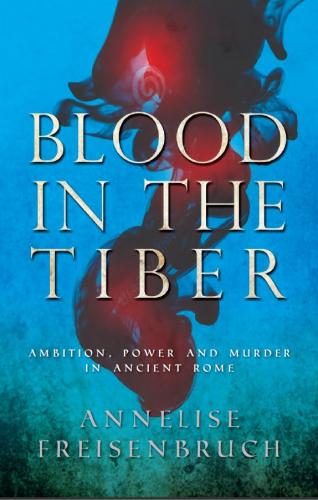Blood In The Tiber

Blood in the Tiber is a mystery set in the late Roman Republic, during the aftermath of the Sertorian war in Spain and the third Servile War (Spartacus’ mob.) It comes from the pen of Annelise Freisenbruch, who has a solid pedigree as a Roman historian, teaching the subject and having already released a non-fiction account of the women behind the Caesars.
Without wanting to throw any spoilers at you, the plot revolves around that old chestnut, the rivalry between two of the triumvirs of Rome, Crassus and Pompey, though some decades before their most famous moments, when they shared power with Julius Caesar. The story centres on a girl of marriageable age named Hortensia, daughter of a renowned orator and lawyer, and involves murder, theft and treason in the houses of the mighty and even in the forbidden sanctuary of the Vestal virgins, culminating in a plot which could shake the Republic to its core.
I will say at the outset that there were a few things that irked me slightly, but I’ll only begin with this, because it’s worth getting them out of the way. One was the appearance of an alligator at the games, when that species is native only to America and China. *Addendum. In conversation with the author I have discovered that this was an intentional addition and is meant to be a highly exotic Chinese alligator, so bear this in mind when you read.* One was the shortening of people’s names in a very twee manner – Hortensia to Horty and Crassus to Crassy – the latter seeming extremely strange when used by people like Pompey. And the third was the use of the name of a place in Spain – Alcantara – which is a Moorish name a thousand years too recent, when compared with her use of Lacobriga (probably modern Lagos). There were a few typos and minor hiccups, but those three were the ones that I consider worth mentioning. They are the reason I mark an otherwise five star tale down to a still-thoroughly respectable four.
On the other hand, Blood in the Tiber is a well-constructed plot. It is very tightly-written, with every loose end tied up, and even a couple of surprises in there. The characterisation is well-done, particularly in the case of the bad guy and of the Lusitanian gladiator side-kick of our heroine. The prose and descriptive are smooth and masterful and the whole thing feels polished and neat. Most impressive to me was that Freisenbruch has taken a cast of largely real historical characters and weaved a fictional plot about them that does not interfere with recorded history in any fashion. Another big win is the level of historical detail that has been filtered into the book from a writer who is clearly well-informed on the subject. I like to consider myself fairly well-educated on the subject of Rome, but the detail of wills and their creation and the process of scribes and their equipment threw new and interesting information at me.
To some extent, I was unsure of the target audience of the book. Sometimes it seemed to be clearly aimed at an adult readership, but there were times when it seemed more angled towards the young adult audience, especially in respect of the heroine. Perhaps this might provide a win for Freisenbruch, as her work may be of equal interest to both markets and while containing a little more adult material, I would not baulk at letting a teen read it.
The upshot? Blood in the Tiber was an entertaining and well-written tale that kept me reading whenever I had the chance, and for all the few faults I could find with it, at no time put me off reading onward. If you are looking for a nice little mystery set in the chaotic period of the Roman Republic, this is worth picking up and I would recommend it.


Have Wordprress, will reblog 🙂
LikeLike
tigers68
November 18, 2014 at 2:39 pm
Reblogged this on Historical Fiction reviews.
LikeLike
tigers68
November 18, 2014 at 2:39 pm
Thanks very much for the nice review. On the alligator thing…I did check up on them but my main point I suppose was that Crassus is just the kind of bloke who would be able to get so exotic an animal as an alligator (of the Chinese rather than American variety, I grant you) to put in an appearance before a Roman audience. Novelty was the name of the game of course when it came to the provenance of beasts in the Roman arena and it also had to be something Hortensia wouldn’t have seen before in her father’s famous menagerie. I take your point on Alcantara – just going for ease of recognition if anyone cared to look the place up on a Roman atlas, but it’s a perfectly reasonable thing to object to. As for Horty etc, well it just seemed to me that the Romans would (and did) have diminutive nicknames for each other, particularly their children, so I was just trying to convey an idea of that in English. But completely understand that it won’t be to everyone’s taste. Thank you very much anyway for taking the time to write such a thoughtful review.
LikeLike
Annelise Freisenbruch
November 18, 2014 at 8:11 pm
Hi Annelise. Thank you for the entertaining read. Re: the alligator thing, I can see what you mean, though without a hint of that in the text I just read it as a mistake. The Alcantara one was a small thing really. And the nicknames just seemed ill-fitting. Just a personal preference. As I tried to get over in the review, I found them a little jarring, but they didn’t get in the way of my enjoyment of the book. It kept me entertained and I shall look up the sequel when it comes out. 🙂
LikeLike
SJAT
November 18, 2014 at 8:19 pm